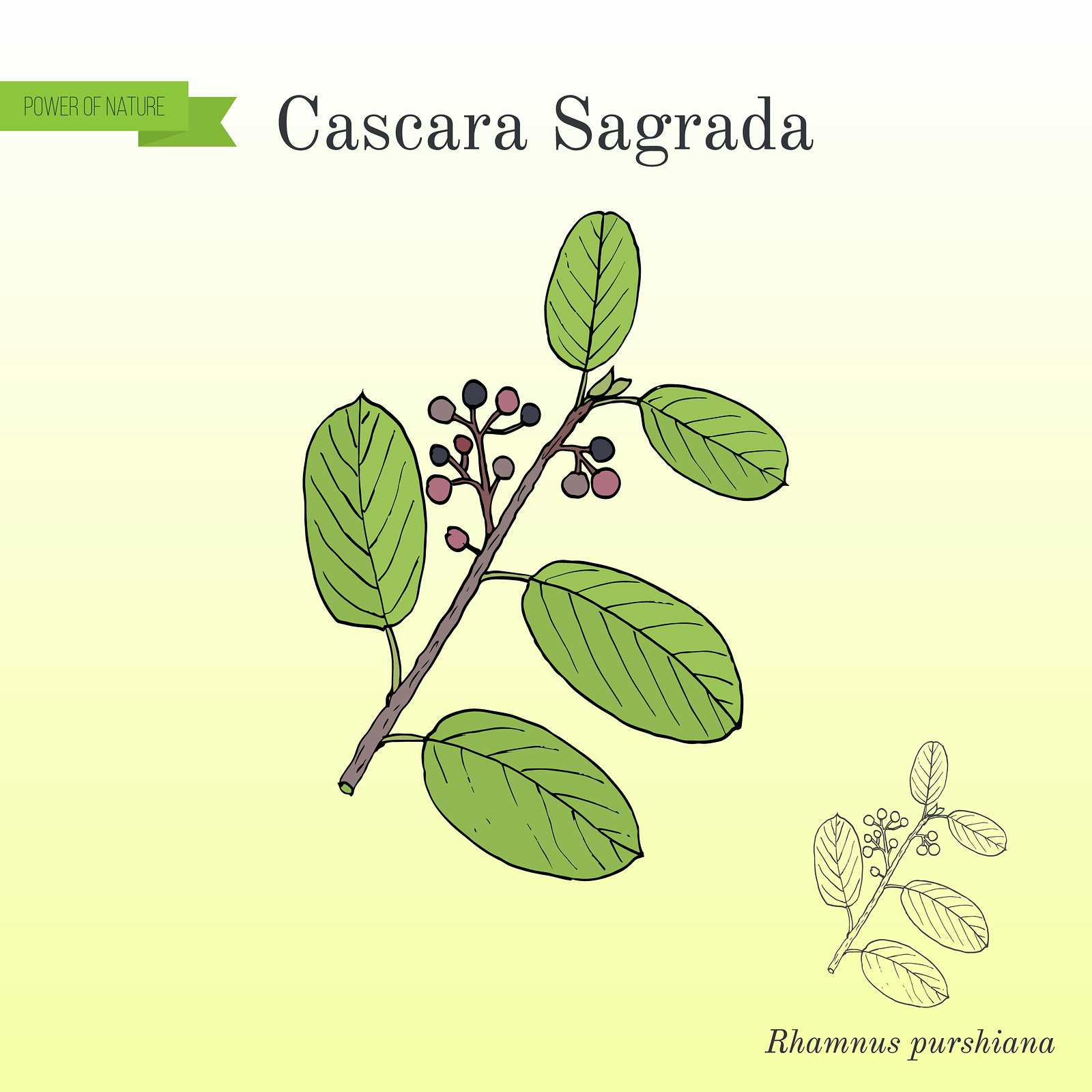
Cascara sagrada, Spanish for “sacred bark,” comes from the American buckthorn tree (Rhamnus purshiana) native to the western coast of North America, from California to British Columbia, and as far inland as Montana. The Spanish priests of California may have learned about it from the Indians. Its primary use has been as a laxative.
In any event, this laxative was not widely adopted until the nineteenth century. A member of the same genus, R. frangula, is the European buckthorn tree, which had been used at least since 1650.
Cascara sagrada is one of the few herbs approved as an over-the-counter drug by the U.S. Food and Drug Administration. The portion of the plant used is the bark.
Active Ingredients:
The main ingredients are anthraquinones.
Emodin and aloe-emodin have also been identified, along with a number of nonlaxative ingredients.
Uses:
Cascara sagrada was used as a laxative starting in the nineteenth and throughout the twentieth centuries. The anthraquinones stimulate the bowel, leading to evacuation after approximately six to ten hours. This herb also provokes secretion of fluid and minerals into the large intestine and inhibits their reabsorption. It was suggested for situations in which a soft, easily passed stool is desirable, such as hemorrhoids or following rectal surgery.
Cascara sagrada is not appropriate for regular use and can cause problems such as dependence if it is used too often. In 2002, the FDA issued a finding banning its use from over-the-counter medications. (Aloe vera was included in the same determination.)
In addition, anthraquinones applied topically can protect skin from ultraviolet damage.
Extracts of R. purshiana can inactivate herpes simplex virus, but this property has not been utilized medically.
Recent research suggests that some components of R. purshiana, specifically emodin, may have anticancer activity (Cell Physiology and Biochemistry, Aug. 10, 2018; Biomedicine & Pharmacotherapy, Nov. 2018; Molecular Medicine Reports, Sep. 2018). More research is necessary before it is ready for clinical use, however.
Dose:
The usual dose ranges from 20 mg to 70 mg daily of the anthraquinones. Products containing cascara sagrada should not be used for more than eight or ten days.
Special Precautions:
Fresh bark can cause nausea and vomiting. The bark should be stored for at least a year or undergo heat processing to eliminate this problem.
Pregnant women and nursing mothers should avoid cascara sagrada.
People with intestinal blockage, undiagnosed stomach pain, or symptoms that might indicate appendicitis must avoid laxatives such as cascara sagrada.
People with diarrhea, inflammatory bowel disease, or intestinal ulcers must not use cascara sagrada.
Cascara sagrada is not appropriate for treating constipation in children.
Adverse Effects:
Cascara sagrada can cause diarrhea and abdominal cramps. Moreover, it can injure the liver (Hawai’i Journal of Medicine & Public Health, June 2015).
Chronic use of laxatives may lead to excessive loss of potassium or other electrolytes, which may be dangerous. In addition, anthraquinones can cause pigmentation of the large bowel.
The most serious problem associated with chronic use, however, is that a person may become dependent on such a stimulant laxative and become unable to evacuate without it. This leads to problems that resemble ulcerative colitis.
Possible Interactions:
If cascara sagrada results in excessive potassium loss, heart rhythm irregularities may occur. This problem could be especially severe for people taking the heart drug Lanoxin.
It would be unwise to use cascara sagrada together with other herbal medicines that can cause potassium loss, such as aloe or licorice.
Medications such as hydrochlorothiazide, Lasix, Hygroton, Lozol, Bumex, and other potassium-wasting diuretics are probably incompatible with cascara sagrada, at least if it were used more than very occasionally.
Cascara sagrada, like other strong laxatives, may reduce the absorption of other medicines taken orally.
Citations
- Nakasone ES & Tokeshi J, "A serendipitous find: A case of cholangiocarcinoma identified incidentally after acute liver injury due to Cascara sagrada ingestion." Hawai'i Journal of Medicine & Public Health, June 2015.
- Chen Y et al, "Emodin and its combination with cytarabine induce apoptosis in resistant acute myeloid leukemia cells in vitro and in vivo." Cell Physiology and Biochemistry, Aug. 10, 2018. DOI: 10.1159/000492544
- Chen Y et al, "Integration of bioinformatics and experiments to identify TP53 as a potential target in Emodin inhibiting diffuse large B cell lymphoma." Biomedicine & Pharmacotherapy, Nov. 2018. DOI: 10.1016/j.biopha.2018.07.168
- Li N et al, "Emodin inhibits pancreatic cancer EMT and invasion by up‑regulating microRNA‑1271." Molecular Medicine Reports, Sep. 2018. DOI: 10.3892/mmr.2018.9304

